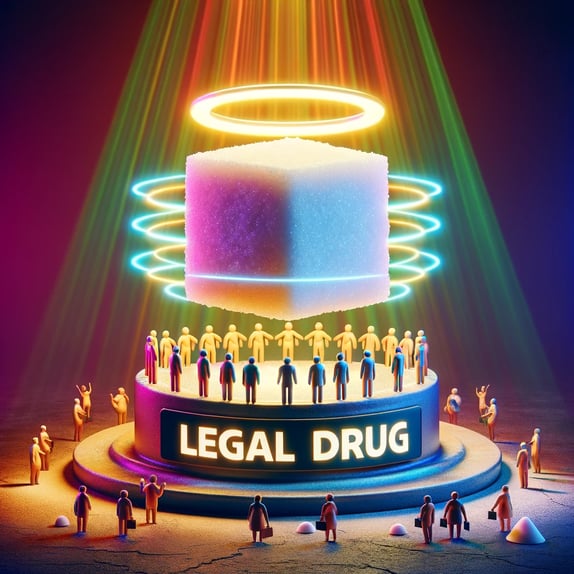Sugar: The Sweetest Legal Drug
Unveiling sugar's addictive nature and its hidden impact on health.
10/17/20242 min read


Imagine this: You walk into your kitchen, open a cupboard, and grab your favorite snack. It’s something simple—maybe a granola bar, a cookie, or even a slice of bread. You take a bite, and your mood instantly lifts. You feel good, energized, maybe even happy. But what if I told you that the feeling you just experienced wasn’t because of the food itself but because of a substance hidden within it? A substance that works on your brain in ways eerily similar to drugs like nicotine or cocaine.
Sounds exaggerated? It’s not. This is the reality for millions of people every single day. The culprit? Sugar. Sweet, innocent, and ubiquitous, sugar has quietly infiltrated our lives in ways we rarely think about. But beneath its innocent exterior lies a powerful, addictive force—one so strong it’s been labeled “the legal drug.”
So, why does sugar have this effect on us? How did something so ordinary become such a powerful influence in our daily lives? And most importantly, how can we regain control? Let’s peel back the layers and uncover the truth behind this sweet deception.
The Hidden Power of Sugar
From your morning cereal to your favorite dessert, sugar is everywhere. But what if I told you that it doesn’t just make food taste better? It alters your brain chemistry. When you consume sugar, your brain releases dopamine, the "feel-good" hormone. This reward system is the same one triggered by substances like nicotine or cocaine. The result? You want more. And more.
But unlike those substances, sugar is not only socially acceptable—it’s celebrated. Birthdays, holidays, celebrations—all are tied to sugary indulgences. Yet behind the scenes, something sinister is happening. Are you truly in control of your cravings?
The Legal Yet Addictive Trap
Unlike other addictive substances, sugar hides in plain sight. It doesn’t come with warning labels or restrictions. Instead, it’s in almost every aisle of the grocery store, often under aliases like “fructose” or “maltodextrin.” You might think you’re avoiding it, but sugar is quietly infiltrating your diet.
The food industry knows this all too well. Sugar is a secret weapon to keep you hooked, turning everyday products into irresistible favorites. But what’s the cost?
The Dark Side of Sweetness
Sugar may taste innocent, but its effects are anything but. Over time, its overconsumption contributes to some of the most severe health issues of our time—obesity, diabetes, heart disease, and even cognitive decline. The long-term damage is undeniable, yet the addiction is so subtle that many don’t realize they’re caught in the trap until it’s too late.
Have you ever tried to give up sugar? The headaches, the irritability, the cravings? These are withdrawal symptoms. Sugar isn’t just a treat; it’s a substance your body has learned to rely on.
Breaking Free
The good news? You can take back control. Start small—read labels, cut back on processed foods, and replace sugary snacks with natural alternatives. The road isn’t easy, but every step you take chips away at sugar’s grip on your life.
Why is this important? Because every choice you make shapes your health and well-being. And isn’t your future worth fighting for?
Conclusion
Sugar may be legal, but its effects are anything but harmless. The more you learn about its addictive nature and the role it plays in your life, the more empowered you become to make a change. The question is, now that you know the truth, what will you do about it?
The sweet escape starts today.
